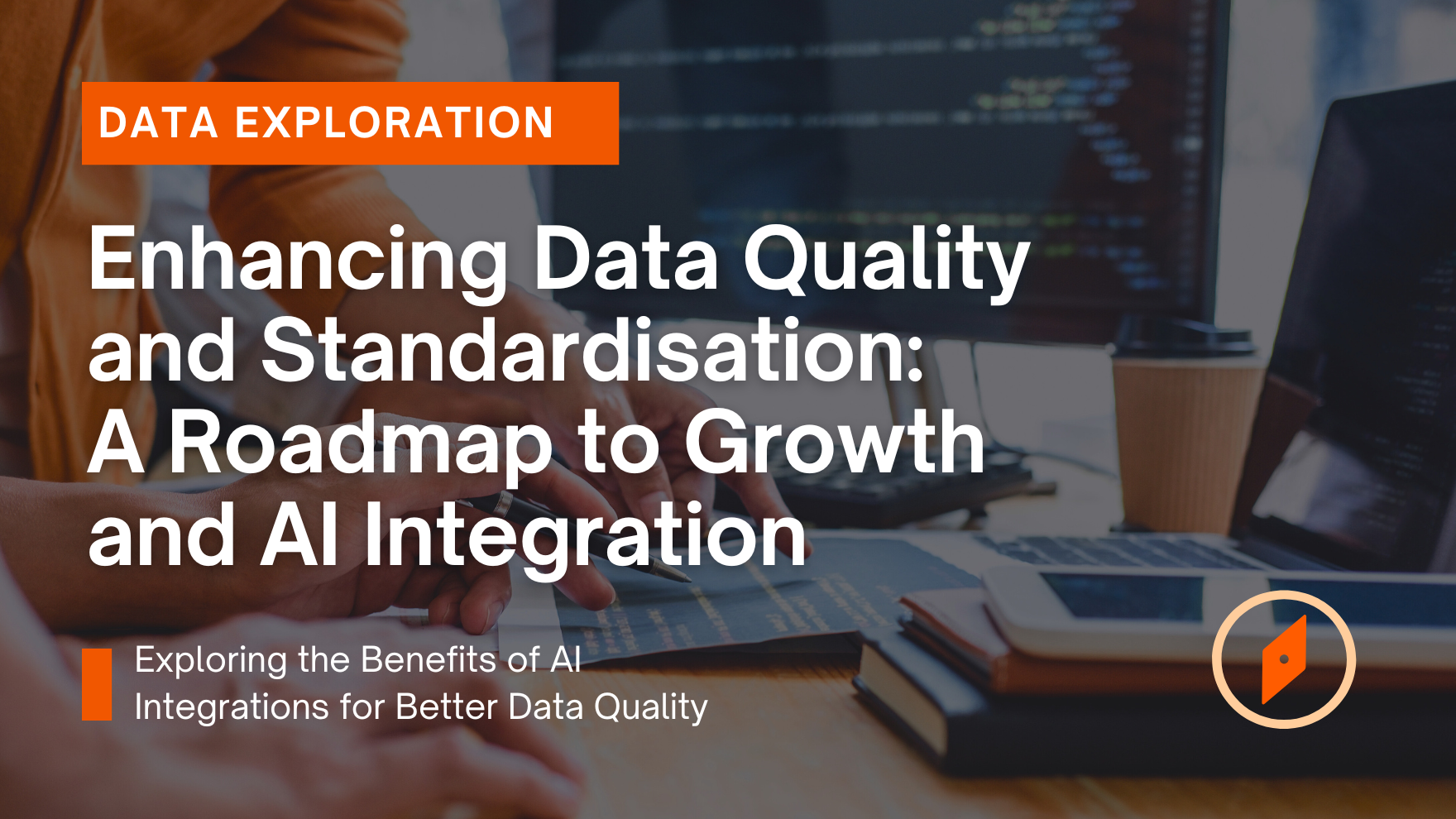

June 18, 2024
In today’s data-driven world, businesses must harness the power of high-quality, standardised data to drive business growth, make informed decisions, and implement advanced AI and ML processes.
This article outlines a structured data funnel that businesses can implement to achieve these goals, ensuring a competitive edge in a rapidly evolving market.
High-quality data is the cornerstone of success. Poor data quality can lead to misguided decisions, inefficiencies, and missed opportunities.
Conversely, well-standardised data enables accurate analysis, efficient operations, and seamless integration with AI and ML technologies.
A Basic Data Funnel
Implementing a structured data funnel is essential for ensuring data quality and standardisation.
Here’s a step-by-step guide:
1. Data Collection
Sources:
· Online Forms: Standardise form fields and formats across all digital touchpoints.
· Client Facing Teams (Sales, Customer Success): Equip teams with CRM tools featuring predefined fields and dropdowns.
· Marketing Team: Integrate marketing automation tools to ensure consistent data capture.
· Events: Use event management software, apps, or forms linked to your CRM to gather data uniformly.
2. Data Input and Initial Processing
Standardisation and validation:
· Form Fields: Maintain consistent fields (e.g., Name, Email, Company, Phone) across all forms.
· Validation Rules: Implement validation checks (e.g., email format, mandatory fields) to ensure data quality at the point of entry.
· Unique Identifiers: Assign unique identifiers (e.g., customer ID) to avoid duplicates.
3. Data Storage
Centralised database:
· CRM System: Use a central CRM system to store all customer data.
· Data Warehouse: Aggregate data from various sources in a data warehouse for large datasets.
· Cloud Storage: Ensure cloud-based storage for easy access and collaboration.
4. Data Cleaning and Enrichment
Regular Audits and Updates:
· Duplicate Checks: Use tools to regularly check and merge duplicate records.
· Data Enrichment: Leverage third-party services to enrich data (e.g., adding industry information, company size).
· Consistency Checks: Regularly review data for inconsistencies (e.g., format, spelling errors).


Did You Know?: Sunstone offers data cleaning and enrichment services. Discover fast, easy, automated data cleaning using the power of AI ➜
5. Data Integration
System Integration:
· APIs: Utilise APIs to integrate data between different systems (e.g., CRM, marketing automation, event management).
· ETL Processes: Implement Extract, Transform, Load (ETL) processes for seamless data flow.
6. Data Usage and Analysis
Reporting and Analytics:
· Dashboards: Create dashboards for real-time data monitoring.
· Reports: Generate regular reports to track key metrics and performance.
· Feedback Loop: Use insights to inform data collection and processing improvements.
7. Data Governance
Policies and Procedures:
· Data Ownership: Define data ownership and responsibilities.
· Access Control: Implement access controls to ensure data security.
· Compliance: Ensure compliance with relevant data protection regulations (e.g., GDPR).
8. Continuous Improvement
Feedback and Iteration:
· User Training: Provide ongoing training for staff on data entry best practices.
· Feedback Mechanisms: Set up mechanisms for feedback from data users to continually improve the data funnel.
· Regular Reviews: Conduct regular reviews and updates to the data funnel process to adapt to changing needs.
Benefits to Business Growth and Decision Making
By implementing this data funnel, businesses can reap numerous benefits:
· Improved Business Decision Making: High-quality, standardised data enables businesses to make informed and accurate business decisions. Reliable data allows for the identification of trends, understanding customer needs, and tailoring strategies accordingly.
· Enhanced Efficiency and Productivity: Standardised data processes reduce the time spent on manual data entry and cleaning, leading to higher productivity and enabling teams to focus on strategic tasks that drive growth.
· Seamless AI and ML Integration: High-quality data forms the foundation of effective AI and ML implementations. Standardised data facilitates the automation of processes, prediction of customer behaviour, and personalisation of marketing efforts.
· Better Customer Insights: Accurate data provides deeper insights into customers, leading to improved satisfaction and loyalty. Understanding customers better allows businesses to offer more tailored solutions and services.
· Competitive Advantage: Robust data processes give businesses a competitive edge in the B2B landscape. Quick responses to market changes, optimised operations, and superior customer experiences are all achievable with high-quality data.
In the past, reliance on platforms like Google Ads has led to volatile marketing costs and fluctuating ROI for many businesses.
The shift towards market insights represents a strategic evolution, offering stability and more predictable outcomes.
Final Thoughts:
Improving data quality and standardisation is not just a technical necessity but a strategic imperative. By implementing a structured data funnel, businesses can unlock the full potential of their data, drive growth, and pave the way for advanced AI and ML integrations. Embrace this journey with a commitment to continuous improvement, and your business will be well-positioned for sustained success in the digital age.
Fill Out the Form Below to Receive Our Comprehensive Whitepaper: Improving Data Quality and Standardisation
Unlock the full potential of your business data with our expert guide! Download our comprehensive whitepaper, “Improving Data Quality and Standardisation: A Step-by-Step Guide” and learn how to implement a robust data funnel that ensures accuracy, consistency, and actionable insights.
Whether you’re looking to enhance your data collection, integrate advanced tools, or establish clear data governance, this whitepaper provides the essential strategies and best practice first steps you need.
Don’t miss out on transforming your data management and driving business growth.
Keep up-to-date with more data-backed insights:
Related Articles
Maintaining Data Hygiene
Imagine if Google Maps was using a 25-year-old city plan. Finding directions for where you’re going would take double the effort since the map would...
The Power of Data Analysis in Sales and Marketing
Data is so much more than just numbers on a screen—it's a goldmine of insights waiting to be uncovered. For sales and marketing teams, data analysis...
Why NACE Codes Fall Short, and How MAP is Changing the Game
Since 1970, NACE codes have been the most widely used classification system throughout Ireland and Europe for grouping organisations according to...








